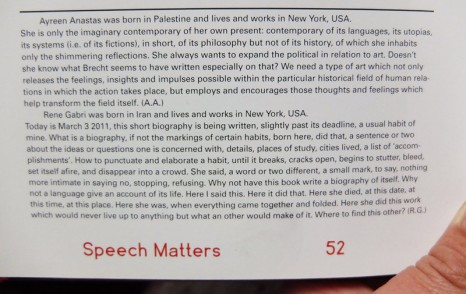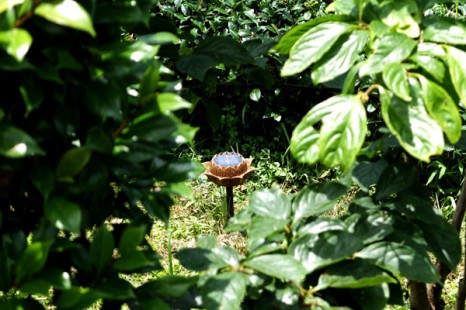
like the way i told myself that i’d be out of this place before the bottle of shampoo was finished, now one quarter left, a grocery list like your ellipses builds up in its stead. 1 Â¥100 China Mobile phone card, a pair of leggings, cherry tomatoes, 1 residence permit, 3 apples, 2 packages of 烤é¢ç‰‡ (cumin or chicken flavour), apricots or peaches, 2 bottles of diet Coke, cashews or almonds or walnuts (salted), 绿豆糕, green basil pesto, 2 jars of Ying’er brand salted peanut butter (yellow lid), smoked 豆è…å¹², avocados, 1 can of Sapporo beer, masking tape, a pair of gardening gloves, multi-vitamins, Whisper brand maxi-pads, 1 big bottle of water, 红薯干, Crest Pro-Health toothpaste, a green stone necklace found in a field, letters and wasted words. Is a list equalising, ä½ è¯´, like the illusion of a history book or a series of object relations? When a pink iron is held mid-air and knowing glances cross a courtyard, a smile is word is a years-long treatise on spontaneity. it’s not a sum as much as an infinitesimal differential, the derivative of the function that realises slowness.
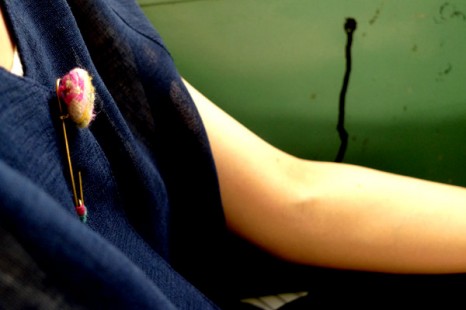
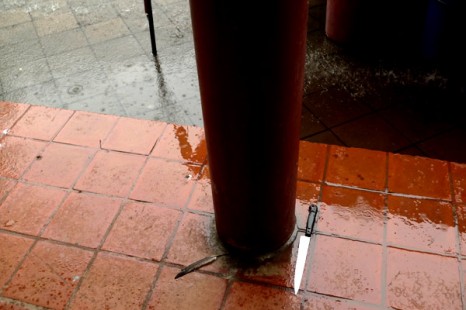
ä½ è¯´ “å°æ°””, but everything feels imbibed, or imbued, like the lost spaces between words we cannot really understand (“precisely as a function of the differential between their positions”). Ellipses. i try to keep track of the list, and yes, sometimes it feels good to try to do something good for someone else, but it’s always hard to tell when exactly we become barbarians. Rarely is it as simple as a list of objects, where sympathy is the square root of identification, a manner of being rude or respectful. weird + polite forever, it keeps us busy …. ä½ è¯´?
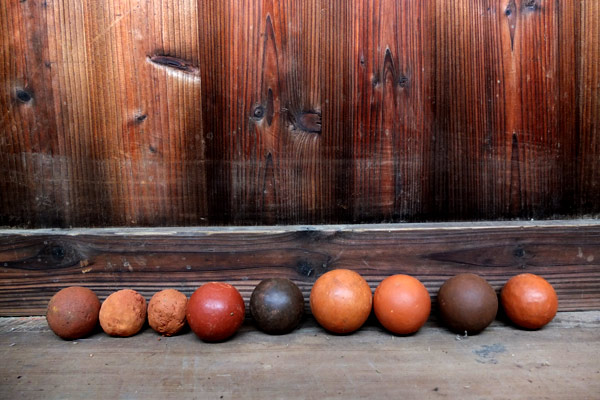
Posted by 丫 | reply »
the light of day – or, the most intense fiery sadness inside the palest of blue
the difficulty of writing. therefore words become physically written entities. are animated by the postures and movements of the hand. the word becomes image. is placed in perspective. the natural rhythms of speech and of reading contorted. a video on writing:
act 1:
the street is where it finally played out, no confining corners of a room, simply a street and a doorstep and a door. a door that remained closed. closed that night and all the nights after. closed for several years. there were a few words there on the street, an evening chill picking up, words uttered from mouths tightly locked into position, not once breaking out into smile, no more spontaneities. now i remember it was an iron. the last object that passed between us. an iron. your iron. my iron. no ironing board. the irony. an iron with no more spontaneities. all those years summed up into the exchange of a single iron. a pink iron.
act 2:
you entered the studio that day and it filled the room. eyes locked and we understood. a kind of understanding that was hard to come by in those days. “we paid people 50 kuai to cry”. leaving the party early i cycled to the apartment that night, shared by several, it was only you there, you and a dvd menu on loop, the same jingle over and over again, you kept emphasizing the word ‘taken’, ‘taken’, ‘taken’ – i guess it was the opposite of what i was getting – the other word that night ‘transgressive’ – you and bataille – he and whitman – i couldn’t do it – sorry bataille – sorry whitman – i couldn’t do it – so much for ‘transgression’ — whenever i revisit the room, you are both there, bataille and whitman, bataille, whitman and me and the king-size bed. the torrent of words finally gets me writing on afternoons alone in the house, just before the onset of twilight.
act 3:
a gallery space, half emptied out, i keep going back there, the mounted and framed photographs are placed on the floor, leaning against the wall, a few are supported by the pillar in the middle of the space, you try to get them to leave, to let them leave us behind, but there is simply no subtle way of doing it and you mutter at them clumsily, they leave, we are left, the afternoon sun is slowly disappearing, the lights are left off, we talk, walk around and shout, until we settle behind the reception counter, a chair and a wall for support, we can do this but we can’t do that, what do you want from me? don’t ask that of me! she tells me his knees were shaking all the way on subway ride back home, i was never shown shaking knees. now, i only ever meet you in that gallery space. we don’t exchange words just glances and parts of our bodies in a deafening silence, the afternoon sun perpetually setting.
act 4:
an early spring evening, i keep trying to leave: “i have a party,” “a party to go to,” “a housewarming party”, but something keeps me at your side all night, first we sit at the “less important people table” and are seated next to each other, after more guests stream in we are both upgraded to the “more important people table”, again placed next to one another. what luck! finally settling into a comfortable position we continue our conversation, your leg brushes against mine a few times, i recall her remark about “woody men”. and i can’t stop staring at the eyes. can’t stop. the whole night – no rooms here, but the chambers of eyes to revisit “an intense fiery sadness” i describe to her later “inside the palest of blue”.
.
immigrant’s on kawara
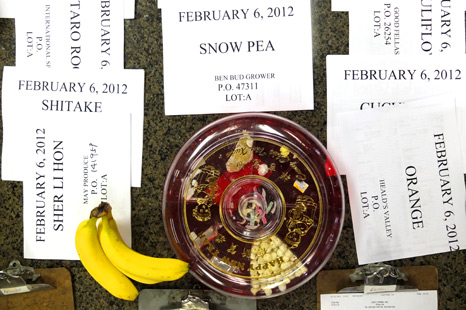
ç¥æ‚¨…这龙年åˆå五 wishing you, on the fifteenth day of a new lunar year
Posted by 丫 | reply »preparing miso

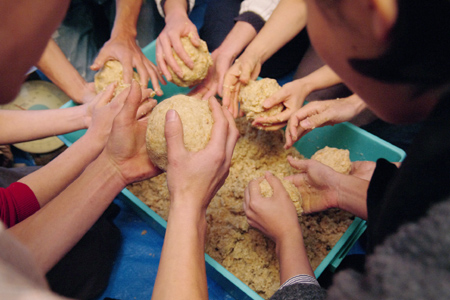
photos by 3.5GH
for rene, wendy, small O and rancière’s translator steven
The waiting room of the Department of Motor Vehicles is of course a dismal place: expectedly generic cream-coloured walls, empty except for an L.E.D. number call board and the state logo plaque, a television in the corner and a single formica counter top with ball-point pens on chains attached to it. The rows of chairs are arranged in two directions, presumably for maximum television visibility, but most people look down at mobile phones anyway, or stare into space somewhere beyond the range of the television set.
But today it is an exciting scene to return to, and waiting vacuously feels like a nostalgic act. It looks exactly the same as it did when I came here many years ago, the same bureaucratic cream wall for the same bureaucratic procedure. And for all it’s clichédness, i’ve missed the variety of colour presented behind all that blankness of expression that can only be witnessed in North America. There are probably as many planets and cultures here as there are individuals in the waiting room, but they’ve cleverly staggered the numbering system so that we don’t examine things too linearly. An Asian boy wearing a shiny black down jacket sits down next to me, his transparent document folder neatly organised with all the required paperwork. He doesn’t have to wait too long, and when his number is called I feel the surprise in the black-rimmed eyeglasses slouched on his nose as he walks away. There is a bearish old man who inches across the room with a walker, but his loud, craggy voice with a strong southern accent (enough to satisfy Michael) flirts with the DMV employee like a slick, young stud; other people in the waiting room smile with their heads down. Everyone is polite.
A skinny, stereotypically troubled looking girl (black eyeliner) wears a sleeveless short dress and lazily kicks her three bags——two black and one teal with an E.T. airbrush print on one side——on the ground in front of her as she moves up the queue. A mother and her two daughters, all dressed in black, wait seated together in the row in front of me. The girls take turns using their iPhones or handheld mirrors to check themselves in preparation for having new ID photos taken. Mother gets up at one point to remind the DMV employee to replenish the toilet paper in the women’s restroom and upon her return, says to the girls, “Well…that’s taken care of.”
Beyond a staggered numbering system of waiting, it is difficult to know whether or not we exist in the same time-space. How did you assume that there was a consensual notion of reality? When could we have used the word “us”? For all our attempts to describe it so, how do we know a relation?
My thoughts move from the backs of people’s heads through to the ninja movie on TV. Flying black-clad zombies are pierced by tips on how to save money and political campaign advertisements. There aren’t any plants here. The mini-blinds along the windows are all open to differing degrees. It’s cloudy outside.
Attention diverts to my own electronic devices now, too. I brought the silver and black mobile phone you left when you moved away. I put my SIM card in it and suddenly our lives are mingled into one interface, except that much of mine is sharpened into little rectangles of an unrecognised encoding. Bureaucracy, an organised form of protectionism, just as easily renders us illiterate as it claims efficiency. For the same reason it is not possible to delete the folder of your text messages, so these few months of your life stay stuck in my hands, another life in another city not here, amidst 60 odd foreign faces at the Department of Motor Vehicles. Everyone looks bland here, but somehow it makes certain relations all the more apparent, and I feel close to you somehow, looking inside-out. I wish you were here to pass the time with me, to run errands together and wait in line and make bureaucratic procedures intimate, like bitter jokes about getting married and having kids.
These are momentary islands of waiting for another radical shift of the senses. Waiting is like insurance for belongingness, and realising now that I’ve missed you all this time I feel a closeness that only occurs in distance. not sure whether I prefer it this way or not.
I ask the attendant behind the computer how long the wait is. “That’s the question of the day”, he quips, and of course we both know that we can never really know how long we have to wait. Ask how much work we can get done in an interim period, or ask how a simple quip and come-back rides us through the day. Ask a slippery American tongue, ask for a decade. When I asked her once about love she said she would choose the option that gave the most possibility. But even no is a possibility. So I try not to count too much.
Posted by 丫 | reply »the last two photos taken before giving up on this camera
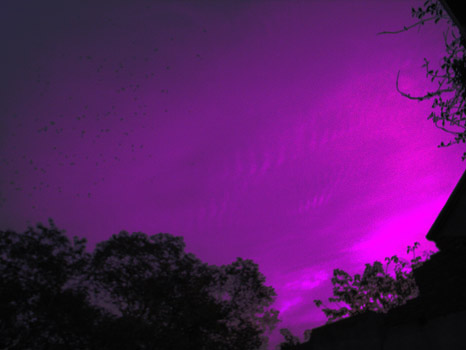
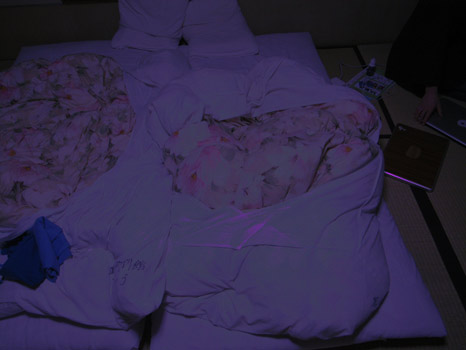
biography Posted by 丫 | reply »
“Visibility makes bare the conflictual nature of autonomy.”
“Visibility makes bare the conflictual nature of autonomy.”
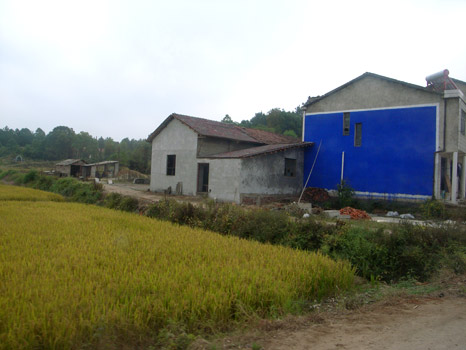
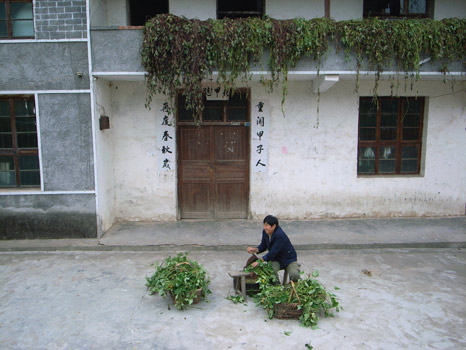
I don’t remember anymore exactly what context these words were written, random scribblings here and there, nowhere near as precise as her drawings, my notes having lost their specificity in time and space——depending upon one’s mood, everything can be about art or love or politics. The truth of that is an X-X-X, or “cha cha cha“, as she says, and even if i didn’t want to teach anybody anything, words fall out sloppily and ego still wishes for someone to pick them up.
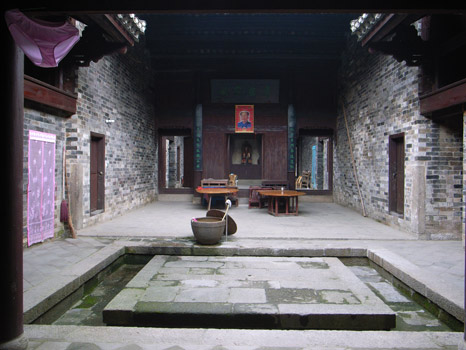
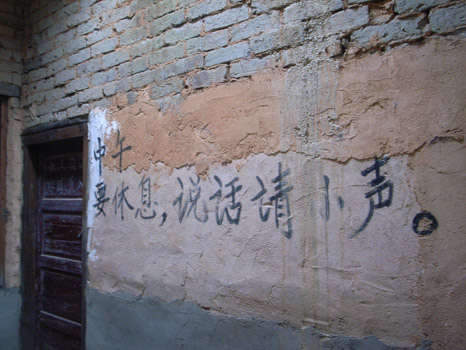
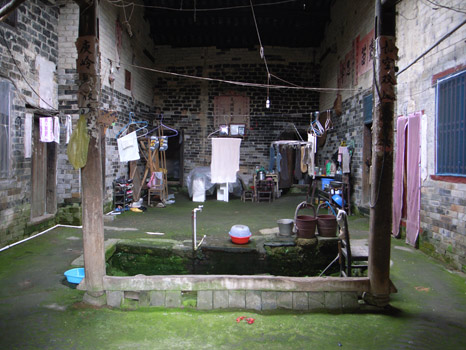
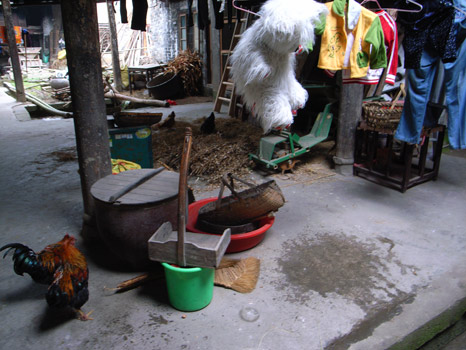
“Visibility makes bare the conflictual nature of autonomy.”
I write it down because i don’t know who you are, or perhaps that’s merely a reflection of how little i know myself. Our togetherness isn’t really about a specificity in time and space, so there was no need to ask for visibility in the first place; we could accept speed, the vaguenesses of motion, non-places and all that sort. And why, would that invisibility make us more connected in some way, as if we could melt into some general idea, the seamlessness of an a-history? “Let’s not leave any traces,” I remember thinking, but my, now isn’t that sloppy.
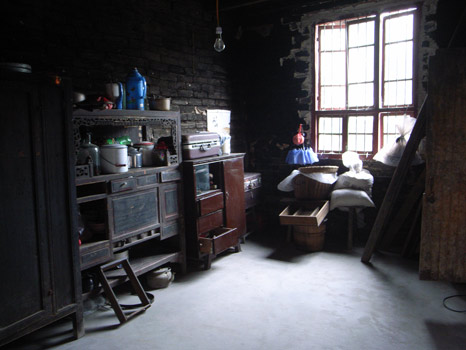
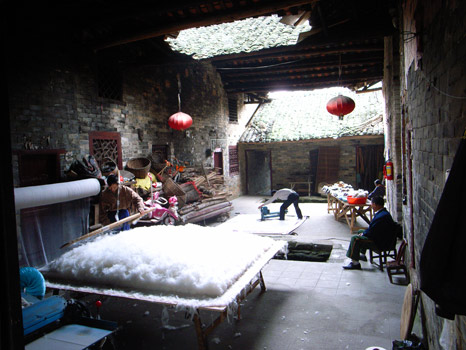
Autonomy was seldom and always the question. Even in art, love, politics and science, like cha cha cha, it was actually the struggle of a singularity, call it human, but this singularity was much more a plea, a collective bargain, only yeah, maybe without singular demand. To be seen is not the same as being heard, and if we tried merely to subsist, voiceless for centuries, would that mean we were toiling backwards, trapped or free? She said today, “It would be very difficult to leave, being born into this kind of life, and if we did, it would be very difficult to come back.” I thought of the freedom of precipices, another dramatic moment, that articulation such that we are changed yet again, forever. What does it mean to be heard?
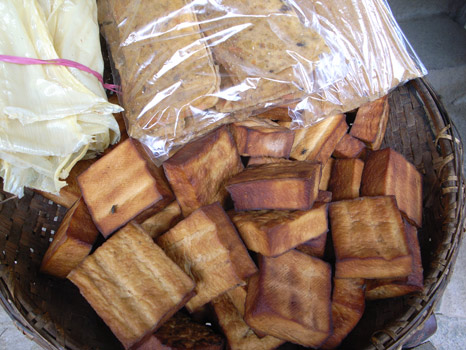
Are we co-conspirators, simply because you see me; what makes this withness, and if love is the thing to turn anyone into people, what holds us together and must we stand apart from everyone else? There are wars in politics, disagreements in science, revolutions in art. But love is both an anyone and a people, constantly exchanging identities, on a precipice. I see you…
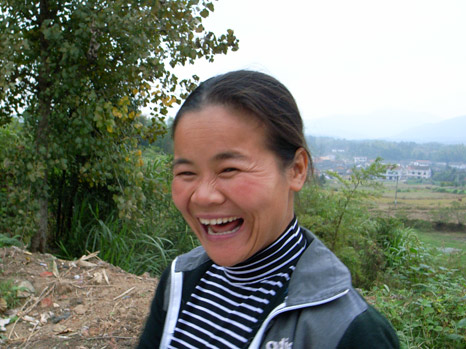 —all images taken Autumn 2011 from å¼ è°·è‹± Zhangguying, Hunan Province
—all images taken Autumn 2011 from å¼ è°·è‹± Zhangguying, Hunan Province
